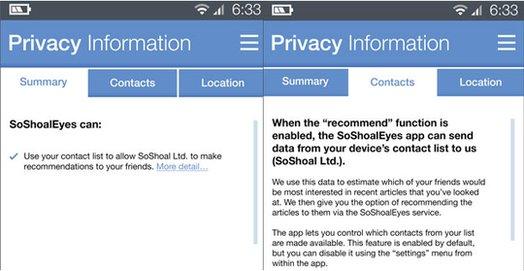Apps must respect privacy over data, says Information Commissioner
- Published

App developers are being reminded about their data protection obligations
App developers should ensure they do not misuse customers' data, says the Information Commissioner's Office in new guidance.
The ICO says nearly half of all app users have decided not to download an app because of concerns over privacy.
It wants developers to be clear about what data is being accessed and why.
More than 320 million apps were downloaded on the busiest day of last year, Christmas Day, and that number is expected to increase this year.
"The app industry is one of the fastest growing in the UK, but our survey shows almost half of people have rejected an app due to privacy concerns," said Simon Rice, principal policy adviser for technology at the ICO.
"It is important that developers tackle this issue by making sure their apps look after personal information correctly."
Alienating users
The guidance from the ICO reminds developers that they must comply with the Data Protection Act and that users must be properly informed about what will happen to their personal data if they install and use an app.
The ICO suggests that users should be given effective control over their privacy settings. Also the layout of a privacy policy could be better tailored to suit mobile devices with users shown brief but important information first, with the option to click through to another screen for more detail.

Users could be shown important information (left) with the option to click through to more detail (right)
Adam Joinson, a professor at the University of the West of England who has researched the link between privacy and new technology, said apps that had a privacy policy that was too generic risked alienating users.
"By asking for too much information they're putting people off using the app. If developers were more canny they'd have fewer issues," he said.
"Users could say, 'I'm happy for an app to have access to my photos but not my address book,' for example."
App designers could be losing out financially because of unsuitable privacy policies which put people off using their products, said Mr Rice.
Simon Lee, chief executive of app development firm Locassa, said the company tailored its data privacy depending on what the app did.
"When we look at how the data is used, we must look at it from a user perspective and ask ourselves, 'Would I be happy with this?' If the answer isn't a resounding 'yes' then there's a strong indication we shouldn't be doing it," he said.
"The bottom line is that users trust us when they install our apps on their devices. We must be careful not to abuse that trust."
- Published16 December 2013
- Published6 December 2013